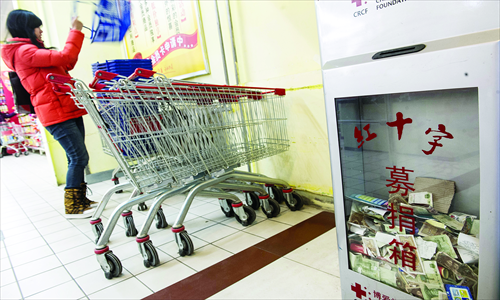Red Cross to increase transparency over donation boxes

Beijing Red Cross has announced it will allow the amounts given to its donation boxes to be publicly scrutinized from next year.
This comes after media reports that donations have slowed to the organization, following several public scandals that hit the organization last year.
Sun Ye, from the relief aid department of the Beijing branch of the Red Cross Society of China, told the Global Times Wednesday that it hopes to make its street donations more transparent.
"We have now 438 donation boxes in Beijing. Each box will be checked separately, and the cash content of every box will be also posted on our website for public supervision," said Sun.
The boxes are found in many public places in Beijing, including at the airport, railway stations, hotels and supermarkets. According to Sun, three parties will participate in collecting the money to ensure transparency.
"Every donation box has two keys, and can only be opened when both keys are used. Beijing Red Cross has one key and the responsible department or enterprise, where the box was installed, keeps another. Bank staff help open the box, and then the money is sealed immediately and sent directly to the bank for counting," said Sun.
When the money has been tallied, a bank statement will be delivered to the Red Cross and posted online.
"Apart from publishing the results online, we've been required to do this by the Beijing Municipal Audit Bureau for a long time. We hope citizens can understand we are strictly following the audit process," said Sun.
Donations to the Beijing Red Cross have decreased since last year's Guo Meimei scandal, reported the Beijing Youth Daily Wednesday.
Guo had claimed she was acting for the Red Cross when she posted pictures of herself online with luxury items. Guo was later found to be unconnected to the Red Cross Society of China.
Sun denied that donations had decreased to the organization.
"People's engaging with charity is always closely linked with social and economic development. So in fact, the [amount of] donation we receive isn't shrinking but continues to grow," said Sun.
Some residents do feel the Red Cross scandals have affected whether they will donate to the society.
Documentary maker Xia Sha, 24, said she has not donated to the Red Cross since the Guo Meimei scandal.
"And I won't donate unless the Red Cross Society publishes its bank records," said Xia.
Liu Jingwen, former deputy secretary-general of Shenzhen Zhengweining Charity Foundation, said that charities have a duty to publish details of donations.
The Red Cross in China should be more democratic in administration, said Liu, and they should allow a board of directors to run its business rather than following government orders.
"A democratic, non-governmental foundation naturally makes credible decisions," he said.
The Beijing Red Cross also intends to solicit donations by text message, online and via a smartphone app next year, the Beijing Times reported.
But another Red Cross employee, surnamed Chen, said text message donation has been used for a long time.
"It was first put into use in 2008, when the tragic earthquake struck Sichuan [Province], and we have been using it ever since," said Chen.
If donors send a text to the Red Cross account, people can donate anytime with a security top limit of 2 yuan ($0.3), and online donations can be given by online transfer or pay platform.
However, the cellphone donation app is still no more than a concept.
"We had this intention, but when we consulted banks we found out the security level of mobile phone applications is still low, so we gave it up," said Sun.
But it is still difficult to account for text message donations, said Sun.
"The mobile service provider gives them to the Red Cross Society of China and it will be delivered to us. So it's hard for us to track the source of the money," said Sun.